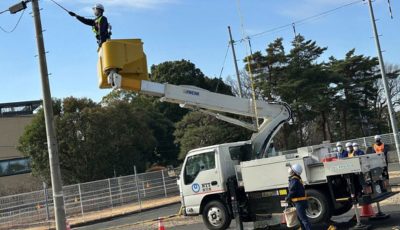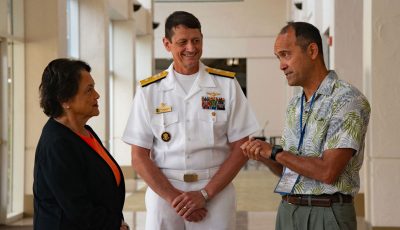Historical impacts and community resilience to natural changes
Editor’s Note: The following is a speech that Gov. Benigno R. Fitial delivered at a climate change symposium held at the Smithsonian’s National Museum of the American Indian last week in Washington, D.C.
As a Refaluwasch descendant, my native people’s roots originated from the island of Satawal, in what was formerly known as the Caroline Islands. Today, the island is a part of the state of Yap in the Federated States of Micronesia. As the name implies, these islands are “micro,” or small islands. Some islands are so small that you can see the ocean from any given point on the island.
As Refaluwasch, or Carolinians, we are known for our skills in the art of traditional non-instrument navigation. Navigators utilized the stars, ocean currents, and winds to make our voyages across the Pacific Ocean to visit family and friends and to feed our people. These trips are oftentimes perilous, and our people who take them are very brave.
The seafaring people of Micronesia continue their sailing traditions today. My late cousin, Mau Piailug, is a well-known navigator. He was the first to share our seafaring knowledge with the outside world. His, and our legacy, lives on through the reintroduction of traditional navigation to our brothers and sisters in the state of Hawaii. Mau’s gift of his navigational knowledge is a lingering reminder that our tradition and culture hold the key to our survival.
Hundreds of years ago, after intense typhoons destroyed most of the Caroline Islands, some of our people left Satawal and settled on Saipan. Our Refaluwasch people were familiar with Saipan because centuries before, our ancestors routinely traveled to these islands on our oceanic sailing canoes to trade goods with the Chamorro. This trade stopped after the Spanish conquered Saipan, Guam, and the other islands that comprise the Marianas Archipelago because the Refaluwasch people heard that the Spaniards were mistreating the Chamorro people.
To survive after our translocation to Saipan, our people relied on our traditional resource use and management practices to adapt to changes in our new environment. One of our traditional practices, which I understand we share with other native cultures, is to use every part of a fish or plant for maximum benefit. Another practice is to grow and harvest resources that are appropriate to the changing natural conditions, such as drought and extreme rainfall. Perhaps the greatest tradition that our people practice is to work together, to share, and to cooperate. These approaches were necessary for our people to adapt to the lifestyles of the past. These traditional practices also brought people together as one community.
Today, we use our traditional approaches to resource use and management to adapt not only to the changes caused by nature, but also by those caused by man.
As governor of a group of islands surrounded by water and far from large landmasses, I strive to remain informed about the changing world environment. I place a high priority on this issue because I know that even the smallest of changes can have a significant impact on our small islands.
Scientists and managers around the world tell us that increased carbon in the atmosphere is leading to global warming, and in turn, is causing more carbon to be absorbed by our oceans and affecting our coral reefs.
Coral reefs are one of the most important areas for the cultures of both the Refaluwasch and the Chamorro, the two recognized indigenous communities in the Northern Mariana Islands. Both communities depend on the coral reef for protection from the waves, especially during typhoons. The coral ecosystem also serves as our main source of traditional and cultural foods.
These coral reefs, which are so vital to our livelihoods and culture, are susceptible not only to strong waves generated from extreme weather events, but also to changes in water temperature, salinity, and turbidity, caused by global warming and other man-made activities. From our traditional knowledge, and based on generations of direct observation, we know that changes in rainfall patterns and storm seasonality can affect a fish’s cue to complete its life cycle. Similarly, plants are also dependent upon cues from the weather to flower and fruit. If we lose our corals, we risk losing integral aspects of our traditions and our culture.
Although our island people are not a major cause of the carbon in the atmosphere, we are looking to help mitigate this problem through alternative energy pilot projects. We have initiated efforts in generating electricity through wind turbines and harnessing energy from the sun. Given that our islands are volcanic, my administration is actively undertaking steps toward the exploration and assessment of geothermal energy on Saipan. Several locations have already been tested and found to have adequate heat to generate this type of power.
In the CNMI, we are also working to help make our resources more resilient to climate-induced changes. To reduce sediments, nutrients, and other land-based sources of pollution that are impacting our coral reefs, we are stabilizing our soils through re-vegetation projects. We are also minimizing the impact of tourism and recreational activities through education, outreach, and cleanup activities. We are regulating fishing practices that are considered harmful to the environment.
Acknowledging that we can’t control the rainfall, we are also implementing road and drainage improvements to make sure that the fresh water continues to replenish the land and near-shore ecosystems, decrease erosion and support coral reef ecosystem health. These are things we can control now to ensure that the impacts we feel from a changing climate are not compounded by our current actions. This is a prime example of our ability to prepare the way to tomorrow, today.
Unfortunately, in our desire to protect the environment from the effects of anticipated climate change impacts, our governments, both local and federal, sometimes adopt policies that are detrimental to the survival of indigenous cultures.
What weight do our cultures have when policies are imposed upon us to close traditional fishing and gathering areas; ban sustainable harvesting practices, or prohibit the taking of traditional plants and animals that we rely on for sustenance?
This is why I strongly believe that it is imperative that consultation with native peoples should be conducted before these kinds of decisions are made. A good example of this is the consultation required under provisions of the Endangered Species Act, in Section 106 of the National Historic Preservation Act of 1966, and in other government actions. These statutes require that native communities be consulted on any project that would impact any place of religious or cultural significance to native people. It is important that this consultation takes place not only consistently, but also in a sincere, authentic manner, and not to merely fulfill a requirement. The native voice must be heard; and it must be heard loud and clear!
We are here this week to share our experiences and to learn from the original stewards of America and the Pacific on how we can adapt to the changing environment in a manner that is culturally appropriate and respectful of our traditions. However, we cannot do it alone. Our governments, locally, nationally, and internationally, must craft and implement sound policies. Likewise, our governments, non-government organizations, businesses, and communities, must support and invest in technologies that focus on energy efficiency, energy conservation, and clean, renewable energy sources that will reduce greenhouse gas emissions.
By using the traditional practice of working together with sincere cooperation and assistance-with the same spirited “Aloha tradition” that Peter Apo spoke of at the opening of this Symposium-we can all arrive at a point where we each agree to be responsible for each other and our environments.
Together, we can make it happen. I believe we can and I believe we will succeed!
****
Benigno R. Fitial is the governor of the Commonwealth of the Northern Mariana Islands.



























